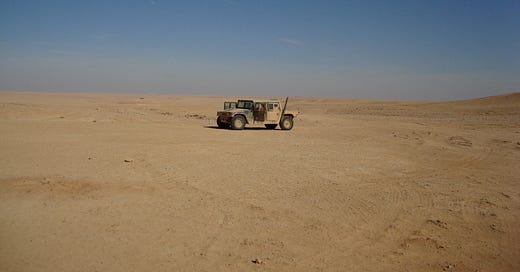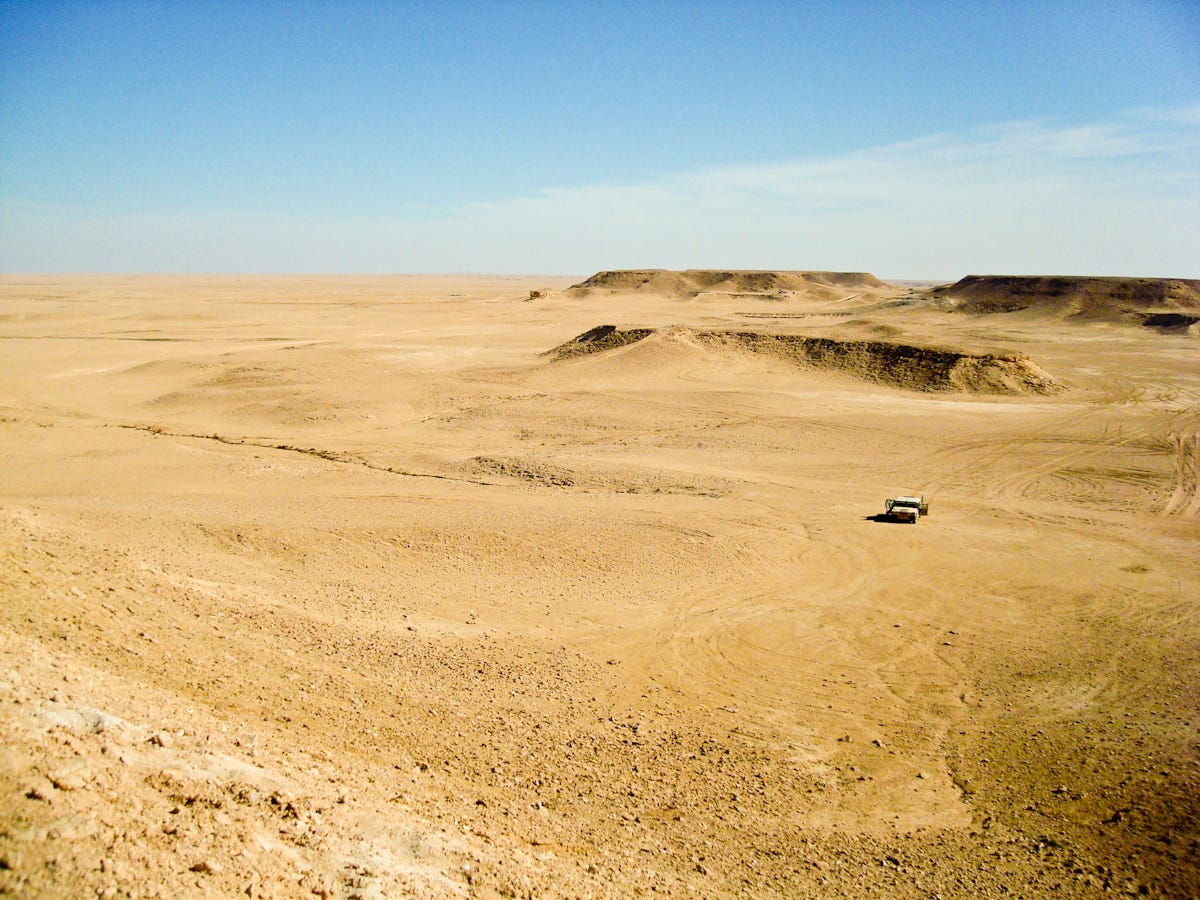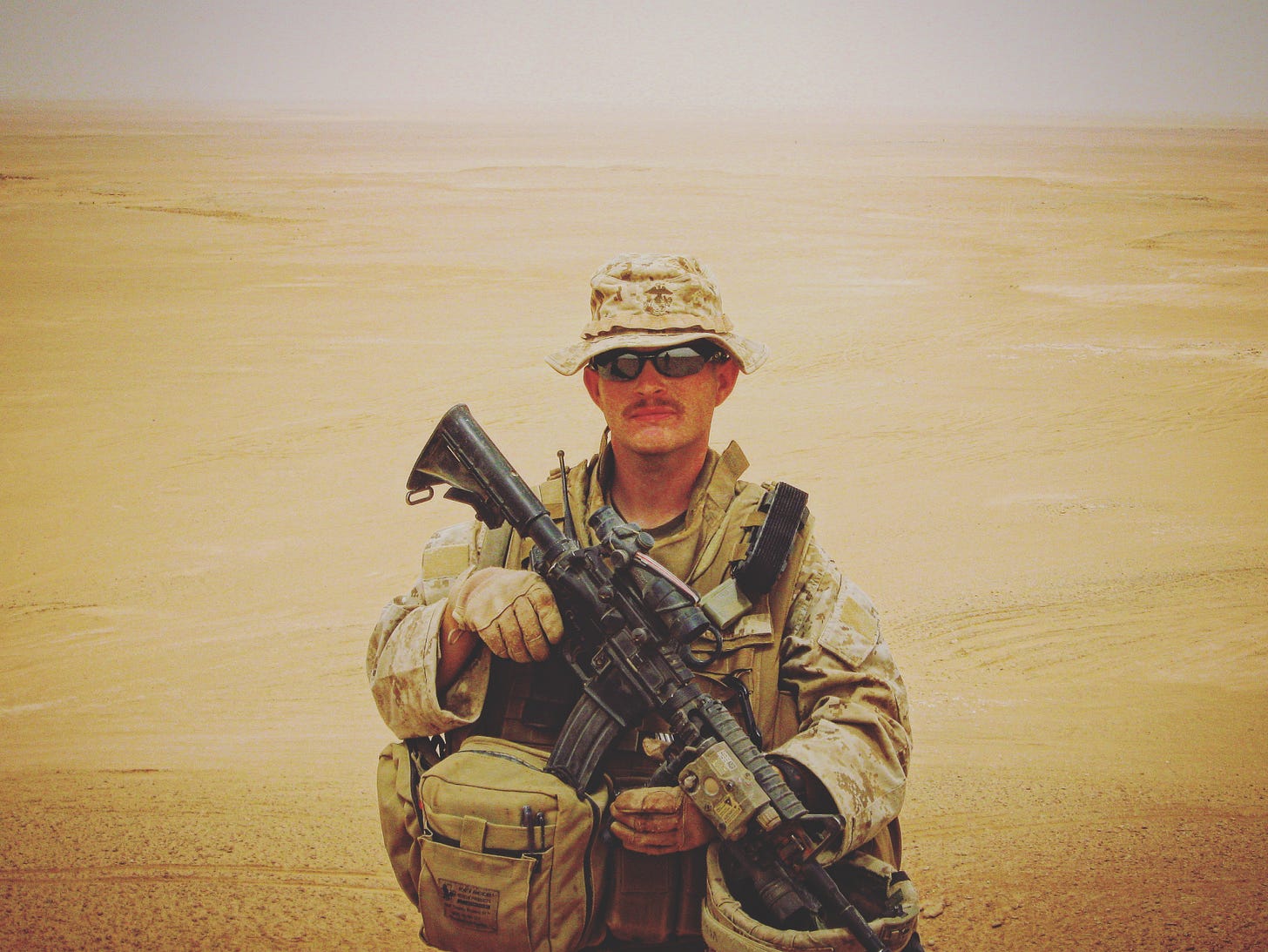Today is my birthday. I am 46 years old.
And today, my firstborn graduates from high school.
Both are occasions I never thought I’d live to see.
That story begins somewhere else—long before today.
I Didn’t Think I Deserved to Live
This was a time when I saw tragedy on a weekly basis.
During the Iraq war, in the mid-2000s, even stateside, grief hung in the air like dust. It settled into everything.
For about three months one year, I worked in the headquarters building of 2nd Marine Division at Camp Lejeune.
“Man, Tuesday was a rough day,” the casualty collection officer called through his open door, to no one in particular. “We’ve got ten boxes being delivered tonight.”
A box meant a casket.
He was referring to ten casualties of war. No one laughed. No one even blinked. Comments like that didn’t register anymore—just a kind of mental shoulder shrug. Daily flights carrying the remains of Marines and Sailors from Iraq or Afghanistan were routine in that office. Coordinating them was part of the job.
One of my duties was to serve as part of the honor guard at military funerals. I was one who would remove the flag draped over the casket and fold it into a triangle. Once folded, I would stand back and watch as an officer would approach the family, hand them the flag, and say the words we all memorized by heart:
“On behalf of the President of the United States, the United States Marine Corps, and a grateful nation, please accept this flag as a symbol of our appreciation for your loved one’s honorable and faithful service.”
Sometimes, while standing there, I would imagine my own wife sitting in that chair, receiving the flag.
Oddly, the thought never made me cry.
I didn’t think it would be a tragedy. Honestly, I sometimes believed it would be better for everyone.
That’s just how I thought of myself back then.
I carried that kind of deep unworthiness with me into combat. I wasn’t determined to survive. I was determined to take care of others. That’s all I knew how to do—take care of people.
What happened to me didn’t matter. I didn’t matter.
I didn’t know how to receive love, because fundamentally, I didn’t think I deserved it.
The Moment I Let Go
I cannot tell you any details of what happened to me in war.
Not because I don’t want to—but because I can’t. Partly because of classification. Partly because my story is bits and pieces of memories I still don’t fully understand or remember clearly.
What I can tell you is what it felt like to almost die.
If you’ve ever been out deep enough in the ocean where you can barely touch the bottom, and you allow yourself to be cast about by huge waves, you have a general sense of what it is like. Only this was different. Waves wrap around you. They fold you and carry you along. You can stand against them and sometimes hold your ground.
This was irresistible.
This had mass.
This was more like a mountain moving through me.
This was instantaneous.
And in that blink of a moment before I lost consciousness, one single thought rang out with perfect clarity:
Well, I guess that’s that.
I remember a strange, almost peaceful feeling of acceptance. I had always known my end would come eventually—but I had been quietly curious about what shape it would take. In that moment, I thought I had found it. My mind served up the shape of my death like a gift, and then I was out.
When I came to, I was completely disoriented. I had no idea where I was, what had happened, or even who I was. It took at least 45 minutes before I could piece things back together—my name, what I’d eaten that morning, what year it was. All the while, the world kept on turning around me. People moved. Voices spoke. Dust settled.
And slowly, I realized I was still part of it all.
The rest of that day—and into the next—I carried with me the most profoundly strange feeling. It was like I had just woken up on this planet for the very first time. I had the unique sensation that I was alive, and somehow that felt… unique. Everything I saw felt shiny and new. Special. Worth appreciating.
Looking back, I can see that I was the most present I’ve ever been in my life. Everything was presence. I had no thoughts of the past, no worries about the future. I was just breathing and walking on this earth, content in the quietly shattering realization that I had absolutely no control over whether or not I got to stay.
And because I was still here, all I had left was gratitude. It came to me not in grand declarations but in something smaller, purer—like a child’s wonder at the everyday.
That kind of presence eventually faded. But the wonder never really left me. To this day, I find myself stopping to notice the little things—a flittering butterfly outside my window; the fading light of dusk on an early summer’s evening; the distant sound of my daughter singing in another room. My ability to appreciate these things is the direct result of several close calls that made me profoundly aware of how tenuously I live on this planet.
But along with that realization came something else that has never left me: a sense of obligation.
See, there were others who didn’t wake up after that event. Others didn’t land safely. Others didn’t return home.
And to this day, I see their faces. I know their names. I remember their voices.
What did their life mean for me?
How can I honor their memories?
How would they choose to live, if they had the chance I’ve been given?
These questions have never left me. They don’t always bring clarity. In fact, I still find myself confused about many of life’s decisions.
But one thing has never been unclear:
My obligation as a father.
What They Never Told Me About Coming Home
My son was born in mid-December.
On January 3rd, I was heading downrange, doing things in the name of freedom I can never talk about.
I was in and out constantly that year—a month here, three months there. When I had a moment to catch my breath and actually participate in life at home, he was almost a year old. I remember being there for his first birthday. Days later, I deployed again. By the time I returned, he was nearly two.
That was just reality—for me, and for many families like mine. Some had it far worse.
There was one guy I’ll never forget. His son was born while we were deployed. He received Polaroids in the mail—snapshots of his baby’s first moments on earth. Everyone was in them: mother, grandparents, siblings, friends. Everyone holding that new life.
Everyone except his father, who sat beside me in a dim tent in the Syrian desert, our only light coming from a battery-powered flashlight swinging from a string overhead. Both of us were covered in sand and sweat.
Together we looked through this stack of grainy photos, and cried.
Just two young fathers, thousands of miles from home, watching the most important moments of our lives happen without us.
When I did make it home, I did my best to be part of my children’s lives. Even as the demands of my work increased and took me away from home on a regular basis, I made it a priority to participate in as much of their lives as I could.
Of all the things I used to imagine when my son was little, graduation day was one of the most frequent. I must have pictured it hundreds of times—when he’d pepper me with questions about physics and engineering, when he’d sit beside me as I typed reports or listened intently while I recounted stories from a recent flight.
In my mind, he was always smiling on that day—shoulders back, full of quiet pride, surrounded by friends and family who loved him. And I was there beside him, beaming.
I imagined that moment as a culmination, a threshold, a kind of sacred handoff from my life to his.
The Love That Won’t Land
I struggle to write this now because the story can’t be told the way I once imagined.
That vision—standing beside my son with pride and connection, having seen him through the first 18 years and launching him into a glorious future—doesn’t reflect the reality I live today.
The truth is, I’ve never felt farther from my son.
Despite being home more these past two years than at any other time in his life, I feel the distance growing. He has retreated, slowly and steadily, closing off piece by piece until even small talk feels like scaling a wall. I’ve learned to treasure even a two-word response. I watched this afternoon as his grandmother, seeing him for the first time in years, approached him and asked for a hug. He flatly refused without so much as looking her in the eye.
I wasn’t the perfect father—if such a thing even exists. My words hurt him at times, of that there is no doubt. I mistook criticism for guidance, correction for connection, control for care. I have mourned the loss of our relationship. I’ve cried, again and again, asking what else I could possibly do to reach him.
But I have also put in the work.
I have shown up. I have invested in his life. I have sustained even the harshest attempts to push me away because I believed he would eventually realize—like I once did—that he matters.
He will eventually realize that he is worthy of the love.
For now, no apology, no sustained effort, not even handwritten letters seem to reach him. For now, he is closed to me.
And I must accept that.
I have no choice. This is my reality.
Learning to Receive What Was Always There
And so, on my 46th birthday, I am struck by a remarkable juxtaposition of emotions. On the one hand, I feel more loved today than ever before. I have more friends and family than at any time in my life—people who truly love me, not because of what I can do for them, or for what I have accomplished, but for who I am.
They love me for simply being me. And they are grateful to have me in their lives.
And they tell me so. Like, on a regular basis!
I have people—friends, not related to me in any way—who freely and openly say to me, “I am grateful to have you in my life.” And that amazes me every time I hear it.
Years of sustained effort—in therapy, in prayer, in recovery, in reflection—have given me the ability to accept what was there all along.
It isn’t the volume of love in my life that has increased. It is my capacity to receive it.
It is my willingness to believe their words, without hesitation, doubt, or suspicion.
THAT, my friends, is my quiet miracle of recovery.
And yet, I feel a hole in my heart where once lived the smiling face of a young boy who wanted nothing more than to spend time with his father. I grieve the loss of our closeness, of the reliability of being able to hold him in my arms or receive him in my lap. The certainty of his willingness to tell me about his day with eagerness and excitement.
But more than that, I grieve because I sense in him the same unwillingness to receive love—the same fundamental belief that he isn’t worthy.
I want to share with him the mourns and wails of grieving loved ones I had to watch as we handed them folded flags and rehearsed words. I want to share with him the weight I feel even today of those I lost, whose voices and smiles still echo in my sleep. I want to share with him the crushing grief I feel, not because I would wish that upon anyone, but because I feel like that’s the only way I can get him to understand:
That is how much we love you.
I always knew the hard part of parenting would be letting our children make their own decisions.
I just thought those decisions would be things like what college to attend, who to marry, or what career to pursue.
I never dreamed it would be waiting for them to decide they were worthy of love.
About the Author
ES Vorm, PhD is a Navy Aerospace Experimental Psychologist, combat veteran, and father of two. After years of service in special operations and research leadership, he now devotes his time to writing, homeschooling, and recovery. His work explores the intersections of war, parenting, trauma, and the lifelong journey of learning to receive love. He writes from the shadow of Washington DC, where he lives with his family—and is still learning, daily, what it means to be present.








